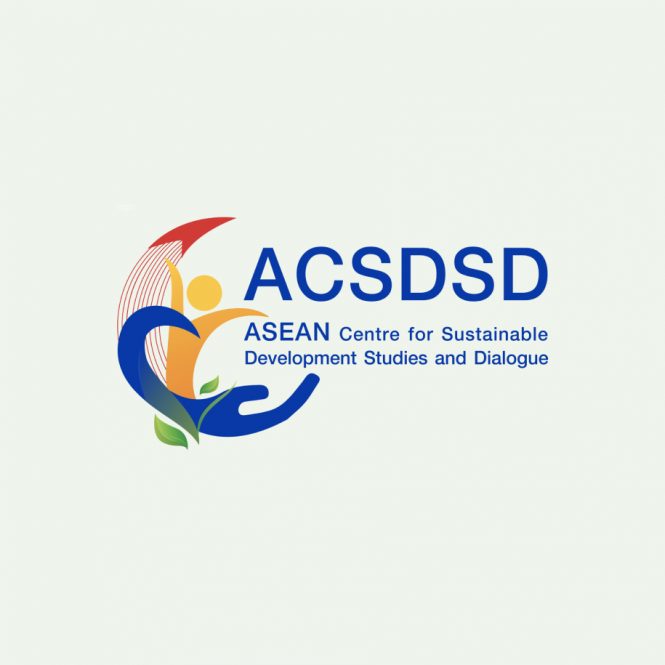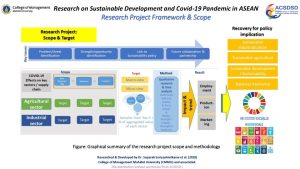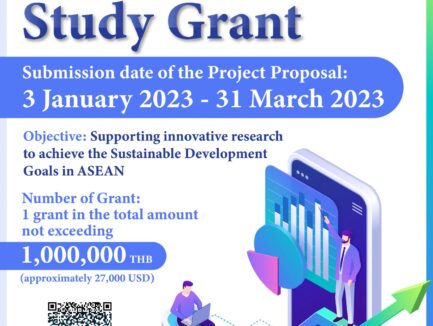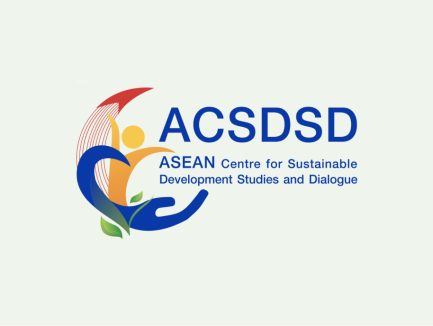
Research on Sustainable Development and Covid-19 Pandemic in ASEAN
Research on Sustainable Development and Covid-19 Pandemic in ASEAN

Notably, this academic report provides detailed analyses of the empirical research to inform policies on Covid-19 impacts and recovery in ASEAN with regard to UN SDGs and in-line with ASEAN Community’s priority areas laid out in the Complementarities Roadmap, as addressed in the ACSDSD Concept Note. The results from this report may provide a meaningful outlook and foresighted lens based on the evidence of Thailand to forge ahead with future collaborative partnership for sustainable development and sustainability in ASEAN.
The main research objectives of this study are: (1) to systematically review and empirically investigate effects of COVID-19 impacts with the agricultural and industrial focus areas in Thailand and the ASEAN region with links to the international sustainable development/sustainability policies (i.e. the Complementarities Roadmap and UN Sustainable Development Goals (SDGs)), and (2) to report any possible balancing recovery responses, directions, resolutions and/or sustainability policy implications for further collaboration and partnership in ASEAN. In particular, this study primarily focuses on investigating the impacts of the Covid-19 pandemic and suggested recovery sustainable development policies on two key sectors (i.e. agriculture and industry), which are the economic and social backbone of Thailand and most ASEAN nations.
To uncover possible suggested sustainable development policies on Covid-19 impacts and recovery in ASEAN, the study employed an evidenced-based empirical research design with the highest international ethical standard. A qualitative research approach was adopted for data collection to meet the research objectives and uncover answers to its inquiries. Specifically, the qualitative study was conducted to collect both primary and secondary data to gather relevant literature, documents and information about the COVID-19 crisis, ASEAN and other related sustainable development/sustainability knowledge. In total, data stem from 51 in-depth interviews with numerous voluntary informants/respondents, who were high-level policy-makers/influencers and other relevant stakeholders from 33 pertinent and reputable organisations or institutes, for insightful analysis and synthesis.
In sum, the resultant report indicates that the virus outbreak has immeasurably impacted on all economic, social, and environmental dimensions and caused various socio-economic and ecological problems in diverse sectors. The crisis has indeed challenged the regional growth and triggered numerous concerns on advancing the ASEAN progress toward the Vision 2025 and the UN 2030 Agenda for sustainable development. However, this research study proposes different regional strategies, resolutions and sustainability policy implications that may help ASEAN cope with the COVID-19 pandemic crisis. It also demonstrates that the proposed strategies are harmonised with the five priority areas of the ASEAN Complementarities while underpinning the UN SDG Agenda to varying degrees. Overall, the research findings may provide practical guidance on economic, environmental and social policy implications about what are essential actions to forge ahead the ASEAN Commentaries Roadmap and UN SDGs and how to support both agendas (i.e. the ASEAN Community Vision 2025 and the UN 2030 Agenda for Sustainable Development). Finally, the research conclusion, limitations and opportunities for future research collaboration and partnership among the ASEAN nations are addressed.
Researched and Development by Assistant Professor Drs. Suparak Suriyankietkaew et al. (2020)
College of Management Mahidol University (CMMU) and associated.

